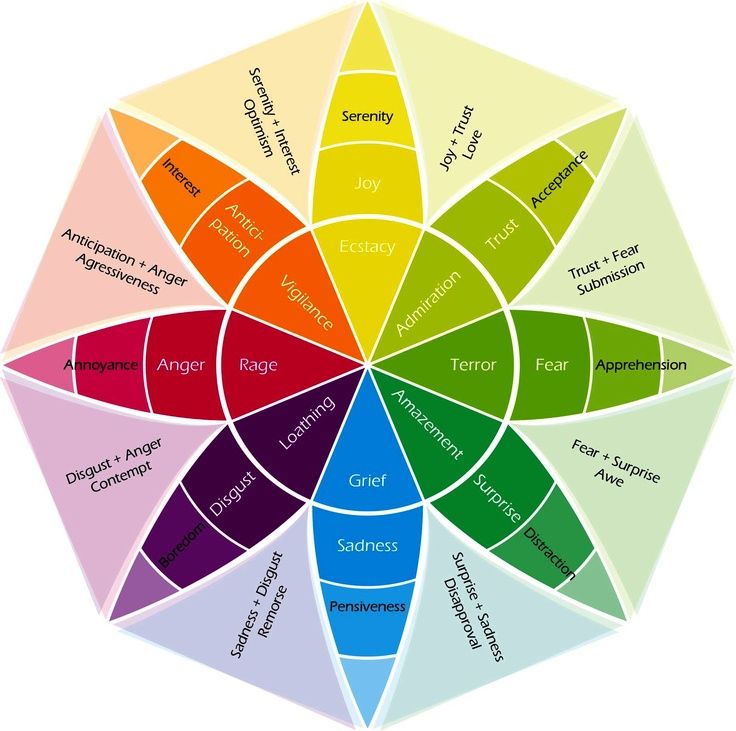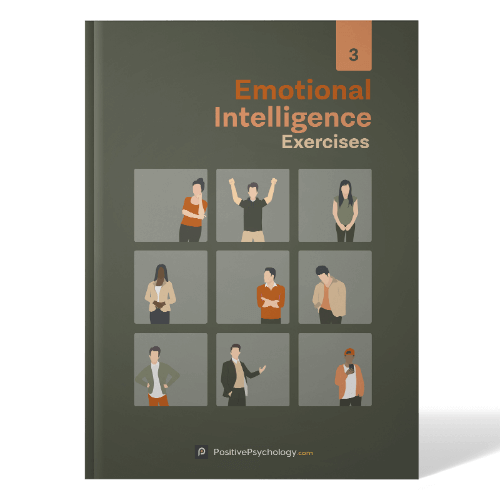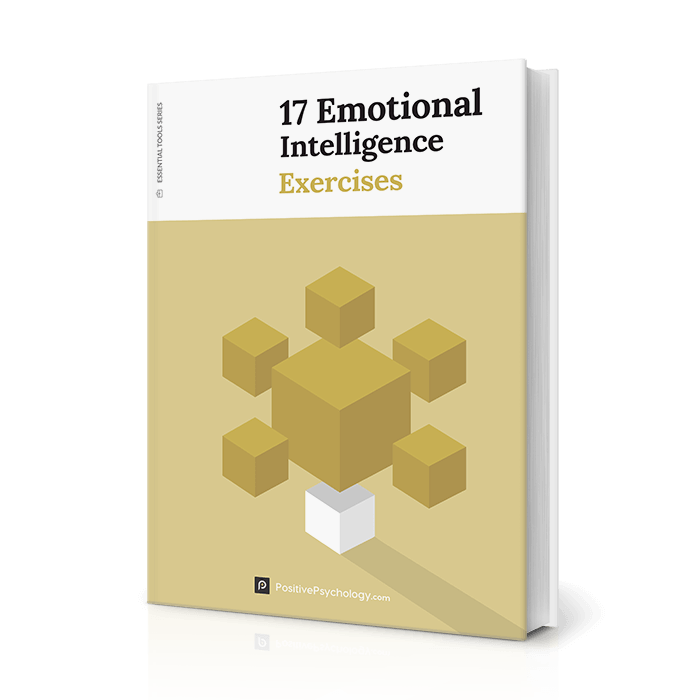Research and Studies
The more research has tried to understand our emotions, the more that’s come to light around the distinction between positive and negative emotions, and the impact of each on not only our mental wellbeing but our physical wellbeing too.
Below I’ve collated a few summaries of the studies I found while researching this topic that will hopefully give you a bit more insight into our current understanding of negative emotions:
- Schwarz and Clore (1996) developed a theory of ‘feelings-as-information’ which conceptualized the role of our emotions in how we make judgments about our environment. They theorized that our emotions provide us with feedback on the safety of our environment and our capacity to handle given situations. In this respect, negative emotions provide us with the strongest indication that something is not right, or that our safety might be compromised.
- Anxiety is often seen as a negative emotion, but it’s a necessary one to spur us to action. We often find it difficult to respond to situations without the presence of this emotion but it’s important to keep it in check as prolonged anxiety can impair our cognitive functioning (Rosen, 2008).
- Adler, Rosen, and Silverstein (1998) explored the impact of negative emotions in the role of negotiation. Focusing on two negative emotions – fear and anger – they found that negotiators who couldn’t control or understand these emotions when they arose were often unable to mediate the situation effectively, despite their training. Similar research has explored the ways different emotions, such as anger and gratitude, impact cognition and behavior within the context of mediation (Williams and Hinshaw, 2018).
- Biswas-Diener and Kashdan (2014) wrote an entire book on the positive motivation that negative emotions can move us towards. They see negative emotions as motivators to help us address and correct behavior and take action.
- Negative emotions have also been studied in cultural contexts. Rozin et al. (1999) explored feelings of contempt, anger and disgust, and their impact within American and Japanese communities on moral codes such as community, autonomy, and divinity.
- Appraisal Theory has also taken a look at negative emotions – specifically anger. Studies have found that people feel angry when they view an event or situation as personally relevant to them, inconsistent with what they are trying to achieve and when this is caused intentionally by another person. Appraisal theorists emphasize the role of perception of potential threats (Lazarus, 1991, Roseman, 1991, and Smith and Elsworth, 1985).
8 Examples of Negative Emotions
As we’ve begun to explore, negative emotions are completely normal. Without them, we wouldn’t be able to appreciate positive ones. At the same time, if you find you consistently have a tendency towards one particular emotion – especially a negative one – it’s worth exploring why that might be.
I’ve summarized 8 of the more common negative emotions and why they might arise:
Anger
Ever have someone tell you no to do something you want? How does that make you feel? Does your blood begin to boil, your temperature rise and do you metaphorically ‘see red’? This is commonly how anger is described. Your body is reacting to things not going your way, and it’s an attempt to try and rectify that.
Often when we’re angry we’ll shout, our face will register our anger and we may even throw things around. We’re trying to get our own way in a situation and this is the only way we can think how. If you’re often reacting to scenarios in this way, it’s a good idea to explore why and come up with more positive strategies.
Annoyance
Do you have a colleague who perhaps talks too loudly? Does your partner always leave their dirty dishes in the sink? Though we may like our colleague and love our partner these behaviors can make us feel really annoyed. Referring to Pluchik’s wheel, you can see that annoyance is the weaker form of anger.
While not as intense as anger, it’s the result of a similar thought process – something has happened or someone is doing something you wish they wouldn’t. And you have no control over it.
Fear
Fear is often cited as one of the core basic emotions, and that’s because it’s heavily linked with our sense of self-preservation. It’s an evolved response to warn us about dangerous situations, unexpected obstacles or failures. We don’t feel fear in order to feel distressed, on the contrary, it’s there to help us navigate potential danger successfully.
Embracing the emotion of fear and exploring why it arises can help you prepare yourself proactively to tackle challenges.
Anxiety
Much like fear, anxiety seeks to warn us about potential threats and dangers. It’s often seen as a negative emotion as it’s thought having an anxious disposition impairs judgment and our ability to act. New research has found the opposite.
Zein, Wyatt, and Grezes (2015) found having anxiety heightened participants ability to recognize faces with angry or fearful expressions. They measured electrical signals in the brain and found that non-clinically diagnosed participants shifted their energy from sensory (expressing the emotion) to motor (physical action) circuits. Basically, participants with anxiety were more ready to respond and react to perceived threats.
Sadness
When you miss a deadline, get a bad grade, or don’t secure that job you had your hopes pinned on, you’ll probably feel sad. Sadness happens when we are dissatisfied with ourselves, our achievements or the behavior of someone else around us. Sadness can be good to experience as it indicates to us that we passionate about something. It can be a great catalyst to pursue change.
Guilt
Guilt is a complex emotion. We can feel this in relation to ourselves and past behaviors that we wish hadn’t happened, but also in relation to how our behavior impacts those around us. Guilt is often referred to as a ‘moral emotion’ (Haidt, 2000) and can be another strong catalyst to encourage us to make changes in our life.
Apathy
Like guilt, apathy can be a complex emotion. If you’ve lost enthusiasm, motivation or interest in the things you’ve previously enjoyed, this could be related to apathy. Like anger, it can arise when we lose control over a scenario or situation but instead of becoming angry, we pursue a more passive-aggressive expression of rebellion.
Despair
Ever tried to achieve a certain task or goal multiple times and not succeeded? Did that make you feel like throwing your hands in the air, and camping out in bed with a large tub of ice cream for company? That’s despair and it’s an emotion that arises when we aren’t getting the results we want. Despair gives us an excuse to give up on our desired goals and it comes back to a self-preservation tactic.
Despair can actually be a useful reminder to take a break and restore, before continuing to pursue a challenging goal.
What Causes Negative Emotions and Why Do We Have Them?
Once you start exploring negative emotions a little bit more, you can really start to see what might cause or trigger them, and why we have them in the first place.
In terms of causes, it could be a number of things for example:
- Anxiety felt around attending an interview for a new job
- Anger at being caught up in traffic
- Sadness at experiencing a break-up
- Annoyance that a colleague hasn’t done the work for a big project
- Despair at not being able to stick to a new workout regime
Emotions are a source of information (Schwarz and Clore, 1996) that help you understand what is going on around you. Negative emotions, in particular, can help you recognize threats (Zein, Wyatt and Grezes, 2015) and feel prepared to positively handle potential dangers (Biswas-Diener and Kashdan, 2014).
Many different experiences in our lives will incite different emotional reactions, to differing degrees of intensity. As a human being, you will experience a full range of emotions throughout your lifetime in response to rapidly changing situations.
Do We Want to Overcome and Stop Negative Emotions Altogether?
In a nutshell, no.
It’s normal for us to want to move away from emotions that make us feel bad. As an evolutionary response, negative emotions in the modern world are not really an indication of a severe threat against us, but overcoming and stopping them altogether would be hugely detrimental to us.
Negative emotions are an incredibly normal, healthy and helpful part of life. I think it’s really important not to fall into the ‘happiness trap’ of believing that these emotions are a sign of weakness or low emotional intelligence. I know from personal experience that trying to hide away from negative emotions, can lead to further emotional pain.
As a human being, you will experience a full range of emotions throughout your lifetime in response to rapidly changing situations. No emotion is without purpose. It’s when we begin to further explore and understand the purpose behind each emotion, that we learn new ways to respond which supports our emotional growth and sense of wellbeing.
When exploring negative emotions, it’s also important to know that they are not the only source of information you have access to. Before you act upon any emotion you should also seek to explore your previous experiences, stored knowledge and memories, personal values and desired outcomes for any given scenario (Shpancer, 2010).
Remember – emotions are a low-level reaction so you get to decide how you respond to them and not let them hijack your behavior.
What are the Effects of Negative Emotions?
While understanding that negative emotions are a healthy part of life is important, there is a downside to giving them too much free reign.
If you spend too much time dwelling on negative emotions and the situations that might have caused them, you could go into a spiral of rumination. Rumination is the tendency to keep thinking, replaying, or obsessing over negative emotional situations and experiences (Nolen-Hoeksema, 1991).
In this spiral of negative thinking, you can end up feeling worse and worse about the situation and yourself, the result of which could be a number of detrimental effects to your mental and physical wellbeing.
The problem with rumination is that it increases your brain’s stress response circuit, meaning your body gets unnecessarily flooded with the stress hormone cortisol. There’s considerable evidence that this is a driver for clinical depression (Izard, 2009).
Further research has linked the tendency to ruminate to a number of harmful coping behaviours, such as overeating, smoking and alcohol consumption, alongside physical health consequences including insomnia, high blood pressure, cardiovascular disease, and clinical anxiety and depression (Gerin et al, 2012, Dimsdale, 2008, Everson et al, 1998).
Another study found that people who indulged in prolonged rumination after a negative emotional experience took longer to recover from the physiological impact of the experience (Szabo et al, 2017).
Rumination can be a difficult loophole to get out of, especially as most people don’t realize they’re stuck in ruminating rut and instead believe they are actively problem solving (Yapko, 2015). This can lead to further implications for mental and physical wellbeing.
How Can They Impact our Health and Wellbeing?
It’s not negative emotions that directly impact our health and wellbeing, but how we react and process them when we do experience them that really counts.
Staying stuck on negative emotions can increase our bodies’ production of our stress hormone, cortisol, which in turn depletes our cognitive ability to problem solve proactively and can also damage our immune defenses, making us more susceptible to other illness (Butler, Klaus, Edwards, & Pennington, 2017; Sapolsky, 1998). Chronic stress has also been linked to a shorter lifespan (Epel et al, 2004).
Anger is the negative emotion that has been shown to have the biggest impact on our health and wellbeing, particularly where this is poorly managed. Studies have connected anger to various health concerns including high blood pressure, cardiovascular disease and digestive disorders (Hendricks et al, 2013).
Boerma (2007) linked unhealthy amounts of anger to increased levels of cortisol, which were implicated in decreased immune system efficiency. Boerma’s research found that chronically angry people were more likely to have a cold, the flu, asthmatic symptoms and skin diseases such as rashes compared to non-chronically angry people.
A newer area of research has explored the impact of negative emotions on our sensory perceptions and experiences. Kelley and Schmeichel (2014) explored the impact of fear and anger on our sense of touch. Participants were asked to recall, relive and write up a personal experience that elicited a fear response or an angry response.
The researchers then administered a two-point discrimination procedure – basically, the participant’s hand was hidden from their view and they were poked in their index finger with either one point or two points.
Participants then had to decide whether they were poked by one or two instruments. Higher inaccuracy suggests a diminished sense of touch. Participants who were asked to recall a fear response consistently demonstrated a reduced sense of touch when distinguishing between one or two points of contact.
The research into the impact of negative emotions on our sensory perceptions is still emerging, but it could provide some great insights into why we might hold on to negative emotions and how they affect our memory of negative situations.
Negative Emotions and Cancer
Some research has begun to look at the link between negative emotions and cancer. Again, in this area, most of the research has focused specifically on anger as a negative emotion and its link to cancer.
Anger as an emotion is normal to feel, but as we’ve already seen from the research, it’s how it’s expressed – or not expressed – that can cause problems. When anger is intense and prolonged, or on the flip side, repressed, it becomes what researchers refer to as unhealthy anger (Enright & Fitzgibbons, 2015).
Unhealthy anger in its repressed state has been linked to cancer. Thomas at al (2000) found that patients with cancer also presented extremely low anger scores when tested, which they felt suggested that the patients were repressing or suppressing their anger. The researchers suggested that this was evidence that repressed anger could be a precursor to the development of cancer.
Other research seems to support their claim. In studies with women diagnosed with breast cancer, researchers report a statistically significant relationship between what they refer to as extreme repression of anger, and the diagnosis of breast cancer (Greer and Morris, 1975).
Women who repressed their anger showed increased levels of serum Immunoglobulin A, which has been linked to some autoimmune diseases (Pettingale, Greer and Tee, 1977).
Penedo et al (2006) focused on the impact of repressed anger in connection to prostate cancer. They found a strong presence of the Natural Killer Cell Cytotoxicity in men who reported that they didn’t repress their anger.
Although these studies do seem to suggest a link, especially with repressed anger, there is still too little research in this area to be conclusive. It also doesn’t show a strong link between anger and all cancers, only selective ones. It’s also worth noting that these studies refer to extreme repressed anger which is quite rare in most people.
What these studies do provide is an insight into the long-term effects of negative emotions like anger when they are not handled in proactive ways.
5 Proven Benefits of Negative Emotions
It’s not all doom and gloom. When handled well, negative emotions can have proven benefits for our wellbeing, and far more research has been poured into exploring this aspect of negative emotions.
I’ve summarised some of the key findings from the research for how negative emotions can benefit you:
1. Sadness can help you pay more attention to detail
Where positive emotions signal that all is well in our immediate environment, negative emotions alert us that there are challenges or new stimuli that requires our more focused attention (Forgas, 2014). Sadness sends us the alert that something is not right and asks us to turn our attention to why this may be, what might be causing it, and what we need to do to fix it.
2. Anger can be a strong motivator to seek mediation
Anger is only followed by aggression in about ten percent of scenarios (Kassinove and Tafrate, 2002). Anger has been proven to encourage you to seek out active behaviors to address scenarios or people you’ve found problematic but doesn’t necessarily mean through confrontation or physical acts.
Anger is a strong alert that encourages you to reflect on why someone might be behaving a certain way, and what you can do to restore peace.
3. Anxiety encourages new ways of approaching problems and challenges
When we feel anxious, we’ll try and do anything we can not to feel that way anymore. Anxiety is closely linked to our ‘fight or flight’ response, which allows your body to create energy quickly, ready for action. When faced with dangerous situations, anxiety will take over and encourage us to seek solutions quickly in order to escape danger (Biswas-Diener and Kashdan, 2014).
4. Guilt helps you change negative behavior
Guilt can be an exceptionally useful emotion. It’s essentially our moral compass and when it goes off, it’s a good indication that we may have behaved or said something hurtful to someone we care about. It’s like our internal system for punishing ourselves when we’ve done something wrong.
People who are more prone to feeling guilty are less likely to steal, do drugs, resort to violence or drink and drive (Biswas-Diener and Kashdan, 2014).
5. Jealousy motivates you to work harder
Jealousy isn’t always malicious. Most of the time it’s what psychologists refer to as ‘benign envy’. Benign envy has been shown to encourage students to perform better on tests and in schoolwork, as seeing another student achieve a good grade made it more tangible for them to achieve too (van de Vien, Zeelenberg and Pieters, 2011).
Next time you feel jealous because someone else has achieved a desired goal, try to see this as a good thing – it means the goal is totally achievable for you too.
Can They Enhance Memory Accuracy?
I touched on this briefly earlier in the article, but yes – it does seem as though negative emotions can help improve our memory accuracy.
Psychological research seems to really back this as a concept. It seems that our emotions increase our ability to access ‘mood-congruent’ information (so, information associated with specific emotions) within our memory banks (Isen et al, 1978, Bower, 1981).
Kensinger, Garoff-Eaton, and Schacter (2006) found that participants who associated negative emotions with different objects versus objects associated with neutral emotions were more accurately able to recall exact visual details of the negatively associated items.
Evidence has also shown that negative emotions enhance both our individual impressions of how vivid the memory is, but also our ability to recall some details of specific events (Kensinger 2007).
Imaging of the brain has also linked engagement with the emotional processing areas of the brain and the areas related to encoding and retrieval of memory (Kensinger, 2007, Bisby and Burgess, 2017).
Negative Emotions and Motivation
There is some new research emerging connecting negative emotions with motivation. Anger has by far been the main emotion explored in this area, and it’s one that’s been repeatedly connected to encouraging and leading to motivation to act within a given scenario, but there is more research needed (Harmon-Jones, Price, Gable and Peterson, 2014).
Biswas-Diener and Kashdan (2014) came up with the idea of ‘wholeness’ – which encourages us to see difficult or negative emotions as a part of the bigger picture of overall happiness. They instruct us that a change is needed and we need to act on the negative behavior to create the change that would lead us to further happiness.
These researchers advise that we need to channel our negative emotions constructively to address our deeper needs and seek out positive outcomes.
‘Second wave’ positive psychology follows a similar vein. Ivtzan, Hefferon, and Worth (2015) ascertain that this new approach to positive psychology sees us embracing adversity, discomfort and negative emotions as a path to building better resilience.
They see negative emotions as an important part of spiritual living and in coming to terms with difficult emotions such as guilt or anxiety, we build a deeper connection with who we want to be and how we want to show up in the world.
In the area of motivation, there is some interesting research on how negative emotions can help us achieve learning goals. Early evidence looking at this connection has suggested that negative emotions such as anxiety and fear in academic contexts are detrimental to success.
Research so far has focused on test anxiety and how this negatively impacts test results (Zeidner, 2014). Newer research is showing that this is more complex than it seems. Rowe, Fitness, and Wood (2018) found that adult learners perceived negative emotions as detrimental, they actually had a beneficial impact within some scenarios.
The researchers concluded that the role of negative emotions is more complex than current research suggests.
I think, as we’ve explored, that it is our awareness and understanding of our negative emotions that can lead to them having the best benefits within any given situation. With greater understanding, we can further utilize our negative emotions to help motivate us to achieve goals and find solutions to the challenges we might be facing.
How Can We Best Control and Deal with our Negative Emotions?
One of the best ways to deal with our negative emotions is through acceptance.
Just as there are benefits to negative emotions, forcing ourselves to be happy all the time can also be detrimental to our overall emotional wellbeing.
Accepting negative emotions, in ourselves and others, are all a part of being human allows us to build better compassion for how they might present themselves and why. Rather than becoming stuck in a mindset that negative emotions need to be avoided or that they are somehow ‘wrong’ to experience, we need to accept they are a natural part of who we are.
Once we do that we can really begin to change how we might respond to them and develop behaviors that are meaningful and bring value to how we express ourselves and engage with others.
6 Tips to Manage, Process and Embrace Negative Emotions
As positive psychology has gained more insight into our negative emotions, it’s also been able to provide us with multiple strategies for balancing these emotions within our day to day lives.
Sims (2017) explored ways to proactively process and acknowledge negative emotions and came up with the acronym TEARS of HOPE to help coach and guide individuals. Here’s what it stands for:
T = Teach and Learn
This is the process of listening to what your body is trying to teach you through the presentation of negative emotions, and learn what they mean. It’s building your own personal knowledge of the way you respond to emotional states, interpreting the signals your body is sending you, and acknowledging that they serve a purpose.
E = Express and enable
Negative emotions encourage us to express them. They are very actionable emotions. The express and enable part of the acronym encourages you to explore this with openness and curiosity. It’s about increasing your acceptance of your natural instincts and enabling them to be present without resentment.
A= Accept and befriend
This follows on nicely from express and enable. It’s about befriending yourself and the way you are as a human. Focus on increasing your acceptance with positive affirmations to bring your sphere of negative emotions into a space of acceptance.
R = Re-appraise and re-frame
Once you’ve begun to accept that this is a natural part of who you are, you can begin to focus on reframing the situation and how you react. Just because a negative emotion has arisen, doesn’t mean you have to react in ways that are detrimental to you and those around you.
Accepting negative emotions isn’t about accepting or excusing poor behaviors, it’s about creating awareness for the self and others to create positive reactions.
S = Social support
Knowing that negative emotions are present in all of us, and in pretty much the same way, can be a fantastic source of compassion and empathy to those around us. It’s how we process our emotions that differ, so seeing someone in the throws of anger, knowing that they are just handling a perceived threat can really encourage us to approach them with compassion, rather than anger ourselves.
H = Hedonic wellbeing and happiness
This is the process of grouping positive experiences with negative. Because we more readily recall negative experiences, it can be useful for us to group them with positive experiences so we don’t fall into a ruminating trap. This way, we can focus more of our energy on recalling the positive experiences.
O = Observe and attend
Take the time to really observe your reactions without ignoring them, repressing them, or over exaggerating them. Use mindfulness to bring your focus to your mind and body and what a particular emotion is creating within you. Attend to these reactions without judgment.
P = Physiology and behavioral changes
Just as you observe your emotional and mental responses, observe your physiological reactions too. Bring your focus to your breath, your heart rate and sense out the changes in your physiology that a negative emotion may have caused. Again, attend to these changes without judgment.
E = Eudaimonia
This might not be a word you are familiar with, but it’s well worth adding to your vocabulary. Eudaimonia is a Greek word which basically refers to having a good spirit. It means you have found a state of being that is happy, healthy and prosperous, and you have learned to engage in actions that result in your overall wellbeing. It means you’re actively striving towards a sense of authenticity in all you do.
I’ve gone through the research available and also collated the below tips to help you manage, process and embrace negative emotions in ways that will help you to understand and find value in them:
Envisage your ‘Best Possible Self’
If you feel like your negative emotions are getting the best of you, that you’re not expressing them in healthy ways or getting stuck in ruminating behaviors, a simple visualization technique could help.
Instead of focusing only on the negative emotion or what you’re doing wrong, focus instead on what you would like the behavior to be.
What does the best possible version of you look like in that scenario? How would they react? What would they say? How would they feel? What would they do after? You can do this as a mental visual exercise or a journal exercise.
Taking the time once a week to practice this can have amazing results on not only your mood but how you approach the scenario next time it comes around.
Practice Gratitude
Practicing gratitude has been shown to have wonderful effects for both the recipients and givers. These effects have long reaching impacts on our mood and perception of events, so it’s worth spending a little bit of time adding the practice to your weekly repertoire.
Whether it’s for a small thing or a big thing, in person, over the phone, a letter or a simple text message, letting someone know you appreciate them or something they have done, can really make a difference in how you perceive and respond to negative emotions.
Explore mindfulness techniques
If you find you have a short fuse and anger is your go-to negative emotion (or if you find you’re always on the spectrum of the anger emotion, regularly experiencing annoyance) mindfulness could help to reframe what you’re feeling.
Follow the TEARS of HOPE guidance and take the time to understand why you may be responding in this way. Mindfulness can help you find the headspace to do this in a positive way.
Learn how to respond versus react
Do you know the difference between how you respond versus how you react? Negative emotions often encourage us to react immediately to a given scenario. When we feel angry, we may lash out or shout. When we become sad, we may withdraw and reject people around us.
Sometimes we need to act on these impulses, but mostly we don’t. By exploring your negative emotions you can start to develop your understanding of how you react, and instead start to switch this to positive ways of responding – which could mean learning that no reaction is required at all.
Know when to take a break
Know when to take a day to yourself. If you are constantly experiencing negative emotions and struggling to manage them, your body is telling you something isn’t right.
Take a day to re-center. Fill this day with positive experiences, doing the things that you know fuel you and make you feel good. This kind of break can help to realign your thinking, give you some space to refocus on why you might be experiencing the negative emotions, and come up with some positive coping strategies.
This is just a quick collation of the tips I felt would be most helpful, but it all comes down to you as an individual. Some of them may work really well, and others not so much. Make sure you try out a few different strategies and find the ones that work best for you.
 We all experience emotions from an early age. As adults attempting to navigate the often chaotic world of modern life, the range of emotions we experience in a day can change dramatically.
We all experience emotions from an early age. As adults attempting to navigate the often chaotic world of modern life, the range of emotions we experience in a day can change dramatically.





What our readers think
Good Evening,
I am currently a part-time student at Arizona State University, and am taking a Well-Being course, which includes your article – this article has transformed how I view negative emotions. I met up with a friend, and shared my new level of awareness, as it related to the role negative emotions have in our lives and its importance. I used to be a fellow conspirator, in the idea that banishing negative thoughts was a great way to deal with them, now I see how important it is to accept and explore the presence of negative thoughts as they are as informative as other emotions we experience. Thank You for your contribution!
Reference for Iliard 2009 is missing
Hi Y,
Thank you for bringing this to our attention. This missing reference has now been swapped to the following:
Butler, K., Klaus, K., Edwards, L., & Pennington, K. (2017). Elevated cortisol awakening response associated with early life stress and impaired executive function in healthy adult males. Hormones and Behavior, 95, 13-21.
Sapolsky, R. M. (1998). Why zebras don’t get ulcers: An updated guide to stress, stress-related diseases, and coping. New York, NY: Freeman.
– Nicole | Community Manager
This article is very great with great coverage, I have been avoiding my negative emotions for a long time now, most times I don’t even know what am feeling anymore only just automatic attempts to block the emotion before it even starts properly. Unfortunately this has been very tough on me as it alway Proceed to make me feel awful in all sorts of way. Reading this article has given me a new perception about the whole issue. I am a resilient type and I always try to improve my situation no matter how hard things get and hopefully with the information from this article and constant practice I will make a positive Change, just baby steps. Thanks a lot for this article.